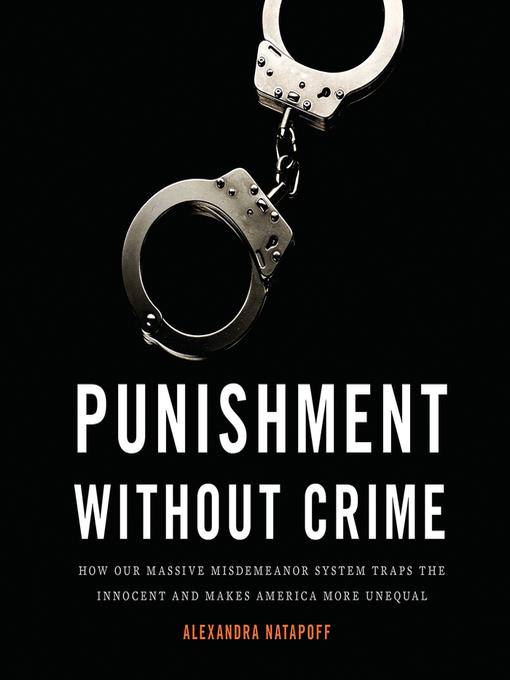
Punishment Without Crime
How Our Massive Misdemeanor System Traps the Innocent and Makes America More Unequal
کتاب های مرتبط
- اطلاعات
- نقد و بررسی
- دیدگاه کاربران
نقد و بررسی

September 15, 2018
A criminal defense lawyer and law professor uses her knowledge and experience to expose the abuse of tens of millions of individuals charged by police with misdemeanors.Those who pay attention to the news are well-aware of wrongful convictions in highly publicized domestic assaults, rapes, murders, and other felonies due to flaws within the criminal justice system. Much less visible are the approximately 13 million misdemeanors filed each year across the United States against alleged jaywalkers, trespassers, parking-meter violators, drivers who don't buckle their seat belts, possessors of marijuana in small amounts, and other minor offenses. Through unprecedented research that fills a previously large gap in the literature, Guggenheim Fellow Natapoff (Law/Univ. of California, Irvine; Snitching: Criminal Informants and the Erosion of American Justice, 2009, etc.) demonstrates how the filing and prosecution in misdemeanor cases often lead to innocent defendants pleading guilty, outcomes that might permanently ruin opportunities for meaningful future employment, housing availability, and income earning potential. Unsurprisingly, the author demonstrates an outsized negative impact on people of color and, more generally, individuals who live in poverty. Natapoff's presentation of her meticulously researched data is impressive, but the most compelling portions of the book are the case studies of individuals across the country, some of whom have been the author's clients. She offers a chapter of history that helps explain how the decentralized U.S. court system broke down in nearly every one of its many jurisdictions. Perhaps the most serious constitutional violation is the huge percentage of defendants appearing before a judge without a defense lawyer appointed. The judges are not always lawyers themselves, and the only appearance on behalf of the government is often the police officer who made the arrest. Natapoff presents common-sense solutions, but some of them will require significant funding, and all of them will require compassion and new ways of thinking from police, prosecutors, and judges.A searing, groundbreaking study of criminology and sociology.
COPYRIGHT(2018) Kirkus Reviews, ALL RIGHTS RESERVED.

Starred review from October 29, 2018
Law professor Natapoff (Snitching) paints a picture of large-scale judicial and police misconduct in this exposé of the misdemeanor system. Drawing on local data from across the U.S. and anecdotes, she shows that many defendants in misdemeanor cases have committed no crimes, are given no legal counsel and no jury trial, and have their fates decided in three minutes or less. Furthermore, she argues, many misdemeanor arrests are unfair: poverty is criminalized and race makes certain people more likely than others to be arrested; in Urbana, Ill., for example, 91% of those ticketed for jaywalking were black despite only 16% of the population being black. Next, grievously overburdened public defenders, daily jail fees that are nigh unpayable for impoverished defendants, and financial incentives for judges to convict lead to overly high rates of conviction. This can have a steep cost for those affected: in addition to driving people further into poverty, a single low-level conviction can render a person ineligible to work for many employers. Intelligently written, tightly argued, and often heartbreaking, Natapoff’s account is a worthy companion to Michelle Alexander’s The New Jim Crow. Agent: Sam Stoloff, Frances Goldman Literary Agency.

February 1, 2019
The subtitle of this volume captures its essence. Natapoff (law, Univ. of California, Irvine; Snitching: Criminal Informants and the Erosion of American Justice; coeditor, The New Criminal Justice Thinking) lends her expertise to describing the complex U.S. misdemeanor justice system. Although mass incarceration is recognized as a serious issue, the misdemeanor phenomenon, by comparison, has escaped similar attention. Natapoff uses data and personal case studies to demonstrate how this overlooked process impacts some 13 million Americans annually, especially people from disadvantaged communities. Yet, the injustices of the system remain under the radar since the vast majority of offenses are largely handled by state and local systems, which may administer justice arbitrarily. While sometimes avoiding jail time, the burden of steep fines and fees can still leave people with a permanent record. VERDICT This well-researched and highly readable work is a model case study of America's criminal justice system. Besides being ideal for use in the classroom, it will attract criminal justice scholars and anyone invested in human rights.--William D. Pederson, Louisiana State Univ., Shreveport
Copyright 2019 Library Journal, LLC Used with permission.

Narrator Janina Edwards captures the frustration and challenges of the many victims introduced in Natapoff's exploration of the American criminal justice system. As Edwards's emotive narration evokes their sympathy, listeners are encouraged to see the inequality the author illuminates. She uncovers deep cracks in the criminal justice system in the ways that it strong-arms individuals into taking guilty pleas or unfairly pits the state against the individual in ways that have long-lasting ramifications. The result is a system that helps to perpetuate crime, inequality, and profiteering. While Natapoff has constructed a compelling argument with numerous voices, Edwards give those voices meaning that may linger with listeners long after the audiobook is finished. L.E. � AudioFile 2019, Portland, Maine

























دیدگاه کاربران